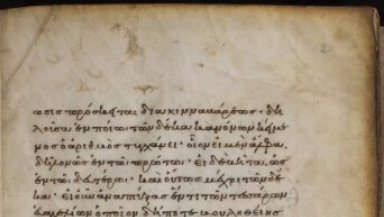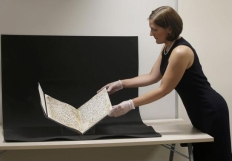
Ancient New Testament manuscripts unknown to scholars have been found at the National Library of Greece.
Seventeen ancient and mediaeval manuscripts have been found in the past 12 months, none of them known to the Institute for New Testament Textual Research in Germany, which catalogues the manuscripts.
While 10 of them have been catalogued by the National Library of Greece, there is no record of them outside the country.
The discoveries were made by staff from the Center for the Study of New Testament Manuscripts (CSNTM), which works to create high-resolution digital copies of the texts and make them available to scholars.
While CSNTM is sometimes able to reunite portions of manuscripts with other fragments, it has also discovered texts unknown even in the libraries that possess them.
The oldest manuscript discovered by CSNTM last year is from the 7th century and is a 'palimpsest', a parchment leaf reused centuries after it was first created by a scribe who scraped off the original writing. The original can still be read using modern imaging techniques.
Other New Testament portions found include leaves used to bind covers to a later manuscript. These consist of one leaf, usually with one side glued to the inside cover which cannot be read. But what can be seen is often older than the manuscript between the covers.

There is also New Testament text found on small reinforcement strips, cut out from other, worn-out manuscripts, that are glued in the margins of pages.
Five of the New Testament manuscripts discovered this year in Athens fit one of these three categories.
Since its inception in 2002, CSNTM staff have discovered more than 90 New Testament manuscripts with more than 20,000 pages of text.
Biblical scholar Dr Peter Williams, Warden of Tyndale House, Cambridge, told Christian Today that the discoveries were "interesting, though not paradigm changing".
While the four surviving "great codices" – the Codex Vaticanus, Codex Sinaiticus, Codex Alexandrinus and Codex Ephraemi Rescriptus – contain most or all of the New Testament, thousands of ancient fragments have survived as well. While these might include only a few words or lines of text, they are still of interest to scholars who can compare them with other versions and build up a picture of how and why the text varied in different places and at different times.















